So, which is the better way to go, coated vs uncoated Guitar Strings? There’s no one correct answer to this question, but there are some important things to consider that will help you choose the type of string that’s best for you.
In this article, I’ll reveal the core characteristics that distinguish one type of coated string from another and how they differ from uncoated sets. Keep reading to learn more!
You can use the table of contents below to take you to the area that interests you. Click on the little box to open it, and then click on the section of the article you want to read, or you can read from start to finish if you want the full guitar string experience!
The Short Answer
Although coated and uncoated strings each have their pros and cons, one string type does not have a clear advantage over the other in every area of consideration. Still, the majority of acoustic players seem to prefer coated strings, while the majority of electric players seem to prefer uncoated strings. Coated strings may be worth the additional cost if your hands sweat a lot and you don’t want to change your strings as often.
Keep On Reading (Below) To Learn More
What Are Coated Guitar Strings?
Coated guitar strings are different from regular (uncoated) strings because they have been “enhanced” by attaching a coating of a particular substance that can improve their tone, playability, and longevity.
The first coated strings began to appear in the mid-1990s
What Are Guitar Strings Coated With?
Strings can be coated with various substances, including PTFE (polytetrafluoroethylene), commonly known as Teflon, the non-stick coating on pans. Other coatings can be enamel-based substances and nano-web polymers.
How Are Coated Strings Made?
The most common way to coat guitar strings is to fuse a thin layer of polymer with steel, nickel, bronze, or nylon. The coating can be applied to wound strings on the core wire and wire wrap. Plain strings can also be coated.
Although any string can be coated, materials like stainless steel and nylon are less likely to benefit because they are not susceptible to rust and corrosion.
Each string manufacturer has their own way of coating strings, which gives them a unique tone, playability, and corrosion-resistant properties. Corrosion is minimized by preventing oxygen and finger grime (dirt, sweat, oil, and dead skin) from coming in contact with the string surface, which can significantly prolong the life of the strings.
Pros And Cons Of Coated Vs Uncoated Strings


Here are the main differences between coated and uncoated guitar strings.
Coated Strings
| Pros | Cons |
|---|---|
| Longer lifespan | Less distinct harmonics |
| Better corrosion and rust resistance | Less sustain |
| Improved tone and better playability | Less string types to choose from |
| May stay in tune longer | Can dampen high notes and dynamics |
| Less string noise (squeak) | May feel “unnatural” or Slippery |
| Easier on the fingers | String Bending and vibrato more difficult |
| Less likely to cause fret wear | Higher cost |
Uncoated Strings
| Pros | Cons |
|---|---|
| More distinct harmonics | Shorter lifespan |
| More Sustain | Less corrosion and rust resistance |
| More string types to choose from | May not sound or play as well |
| Won’t dampen high notes and dynamics | May go out of tune faster |
| Don’t feel “unnatural” or Slippery | More string noise (squeak) |
| String bending and vibrato easier | May cause more finger discomfort |
| Lower cost | More likely to cause fret wear |
Keep On Reading (Below) To Learn More About Each Topic
Who Are Coated Strings Best For?
Coated strings are particularly useful for guitar players that sweat a lot.
The extra string longevity can minimize string changes for gigging musicians and guitar store retailers.
The coated surface can dampen or eliminate string noise and squeak, making these strings ideal for the recording studio.
Although coated strings are typically more expensive than uncoated string sets, they can be cost-effective for players that need balanced tone and accurate intonation, even with minimal string changes.
Which Guitars Can Coated Strings Be Used On?
There are coated string sets available for every type of guitar, including acoustic steel string, classical nylon string, and electric.
It’s essential to use the proper string set for the type of guitar you play to get the best sound and performance and to avoid possible damage to the instrument. If you are unsure what type of string set your guitar requires, check with the guitar manufacturer or the dealer where you purchased it.
Do Coated Or Uncoated Strings Sound Better?
Players of all musical genres have debated this question. But, of course, individual guitarists will also have varying opinions, so there isn’t a right or wrong answer.
My Experience With Coated Strings
I used various types of coated strings over the years, with mixed results. In addition, some of my bandmates swear by them, while others don’t like them at all. Ultimately, it all comes down to what works best and sounds good to you.
It’s useful to think about coated strings in terms of the type of music you play and the instruments you use to play it.
I agree with the consensus of opinion that coated strings have better tone and play easier on acoustic guitars. In contrast, uncoated strings have a more classic sound and perform better on electric instruments.
The Best Coated Strings For Acoustic And Electric Guitars
I have gotten the best results using coated strings on acoustic steel string guitars. The coating makes the strings easier to slide up and down with my fingers, with minimal or no squeaking sounds. Also, I like the way the coating tends to balance out the tone and make it sound richer.
Acoustic Steel-String Guitars
If you’re interested in trying out a set of coated strings for your acoustic, I’ve had the best luck with Elixir strings. They have a phosphor bronze wrap wire with an “Ultra-thin NANOWEB Coating” to give them an “uncoated” feel. I can still feel the coating, but it doesn’t get in the way of the strings’ performance.
They make my Ovation acoustic sound great, and they really last much longer than traditional sets if you clean them well after each use. I like their custom light gauge: .011 .015 .022 .032 .042 .052.
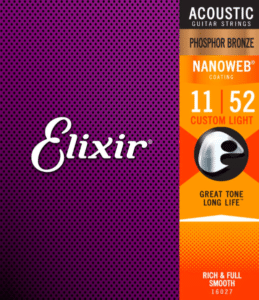
Click HERE To Check Reviews & Price On Amazon
Acoustic Nylon-String Guitars
I have yet to try any of the coated nylon guitar strings, which claim to increase overall tone and brightness and extend string life. However, my friend uses D’Addario XT, coated classical guitar strings, and he really likes them. They are nylon monofilament strings with tie ends and silver-plated copper wrap wire with corrosion resistance treatment.
Here’s the set if you’re interested in learning more.
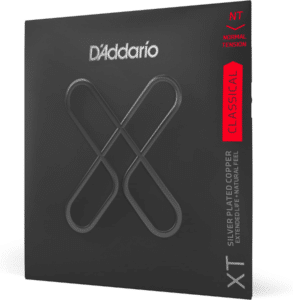
Click HERE To Check Reviews & Price On Amazon
Electric Guitars
I don’t particularly care for coated strings on my electric guitars; each time I try them, I always return to uncoated strings. My issue is that the strings are not as bright and dynamic sounding as uncoated strings, and pinch harmonics don’t seem to “pop.”
In addition, the smoother string surface takes some getting used to, especially if you have your string action set low, to keep your fingers from slipping off the strings when bending them or doing finger vibrato.
I would have to say that I’ve had the best luck with Ernie Ball Regular Slinky (10-46 gauge) Coated strings. The wound strings are treated with a micro-thin layer of enamel that prevents corrosion and prolongs string life up to five times as long as an uncoated set.
The plain strings have rust-resistant plating along with a patented reinforcement winding of titanium wire to prevent breaking at the ball-end when bending or using a whammy bar.
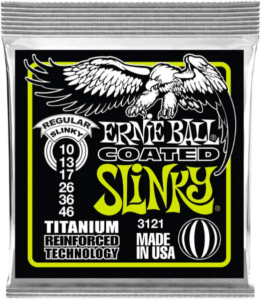
Click HERE To Check Reviews & Price On Amazon
Still, when it comes right down to it, I prefer Ernie Ball uncoated Regular Slinky (10-to-46 gauge) strings on most of my electrics, and occasionally, I use a Super Slinky (9-42 gauge) set. It gives me the classic Rock sound that we all know and love!
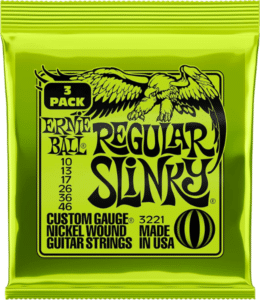
Click HERE To Check Reviews & Price On Amazon
How Much Longer Do Coated Strings Last?
Although coated strings definitely last longer than uncoated ones, the lifespan of the strings can be highly variable.
Things like the brand and model of the strings, the guitar, your playing style, how much you sweat, temperature, humidity, and how often you clean the strings can all affect their longevity.
Once you try a set of coated strings, you’ll get a good idea of how long you can expect them to last. Like with uncoated strings, always keep an extra set of coated strings in your guitar player in case one breaks, especially if you play out!
Extending The Life Of Guitar Strings
Here are some things you can do to help extend the life of coated and uncoated strings.
Minimize dirt, oil, and sweat on your hands by washing them or wiping them with a clean cloth before you play your guitar. Even if your hands look clean, finger grime not visible to the naked eye can build up on the strings over time.
If your hands sweat a lot, wipe or wash them between sets. Wrist bands can help prevent sweat from dripping down your forearms and wrists onto your hands. Also, try to minimize your exposure time under hot lighting like stage spotlights.
Wipe down your strings with a clean microfiber cloth each time you play, and preferably after each set. Use a string cleaner once a week if you play your guitar regularly.
Keep your guitar in its case to help minimize the adverse effects of intense sunlight, abrupt temperature changes, and humidity on the strings.
Are Coated Strings Worth The Extra Money?
This is a decision that only you can make. It depends on things like how much improvement in tone and playability a coated string set will provide and your budget.
Although a good quality coated string set can easily be two to three times more expensive than an uncoated set, it can last three to five times longer if properly cared for.
Therefore, a coated set may not be that much more expensive in the long run. The best way to find out is to try a set and see how long they last before you need to replace them. You might be surprised at the outcome!
Beware Of Stringing Nylon Guitars
If you have a guitar that takes nylon strings, like a classical or flamenco guitar, it’s important to use a coated or uncoated nylon string set with the proper tension. If you need help determining which string set to use, check with the guitar manufacturer for the correct specifications.
Failure to use proper tension strings could cause damage to the guitar, especially the bridge.
Never use any type of metal string on a classical or flamenco guitar!
Frequently Asked Questions
Here are some of the questions I get asked about guitar strings.
If your question does not appear here, please put it in the comments, and I will get right back to you with an answer.
How Important Are Guitar Strings?
The type of guitar strings you put on your guitar is an essential part of your instrument’s sound. Things like the string gauge, overall design, materials, and coating help shape the sound coming from your guitar, for better or worse!
Two string sets from different companies with identical specifications can sound and play differently due to variations in the manufacturing process.
What Happens If You Don’t Replace Guitar Strings?
Eventually, guitar strings get old and worn out. If your strings play or sound different or won’t stay in tune, they most likely need to be cleaned or replaced.
Worn-out strings that have become corroded, rusty, and pitted can damage your guitar frets, even if they are coated. The more you play, the more frequently you will need to replace the guitar’s strings.
Do Guitar Strings Break Easily?
Thinner (lighter gauge) strings are more likely to break, especially if they are bent or used on a guitar with a tremolo bridge. On the other hand, if you are an aggressive player or use a whammy bar to raise the pitch of the strings, you might need a thicker string gauge or strings with reinforced ball ends.
Additionally, strings that are worn out are more likely to break, especially the G, B, and high-E strings
How Many Times Should A Guitar String Be Wound?
A guitar string should only be wound around a tuning peg post the number of times required to keep it from slipping. Too many windings that overlap each other will go out of tune, especially if you use a whammy bar.
Generally, use two to three wraps for the wound strings (E, A, and D) and three to four wraps for the plain strings (G, B, and high-E).
If you have locking tuners, try to keep the string wrap at less than one full turn.
Are Coated Guitar Strings Easier On Fingers?
Yes, some players say that coated strings can cause less finger discomfort due to their smoother feel, especially when playing long sets on an acoustic instrument or using thicker gauge string sets.
If you bend strings or do finger vibrato, the decreased friction on the surface of a coated string could make it more challenging to play without your finger slipping off the string, especially with low string height (action).
Do Coated Strings Reduce Fret Wear?
Yes, coated strings can reduce fret wear, particularly if you press the strings down hard when you play or bend strings with your fingers or a whammy bar. However, uncoated strings (wound and unwound) are more likely to cause fret wear, especially if they are made from stainless steel.
Final Thoughts

I hope you found this article on coated vs uncoated guitar strings helpful!
Coated strings began to appear in the mid-1990s. They are “enhanced” by attaching a coating of a particular substance that can improve their tone, playability, and longevity. They are most commonly coated with Teflon (PTFE), enamel-based substances, and nano-web polymers. This makes them more expensive than uncoated string sets.
Although coated and uncoated strings each have their pros and cons (see above chart), one does not have a clear advantage over the other in every area of consideration. It comes down to the combination of things you want in a string set and your budget.
Still, the majority of acoustic players seem to prefer coated strings, while the majority of electric players seem to prefer uncoated strings.
Coated strings are particularly useful for musicians who sweat a lot and don’t want to change their strings as often. In contrast, uncoated strings give you a more traditional sound and playability.
There are coated string sets for every type of guitar, but it’s essential to use the proper string set for the guitar you play to get the best results and avoid damaging your instrument.
You can extend the life of coated and uncoated strings by cleaning them thoroughly after each time you play your guitar.

Here’s a video from Ernie Ball that takes you through their various types of guitar string sets and how they are manufactured, including their coated strings. Check it out, and you’ll be glad you did!
Related Article ➡ Why Change Guitar Strings? – Tips To Play And Sound Awesome!
Related Article ➡ What Type Of Guitar Slide Is Best? – Transform Your Sound!
Tell Me What You Think

Please leave a comment below if you enjoyed this article, have any questions about guitar strings, or want to give your point of view. I will be happy to help you.
- Have you used coated strings? What kind?
- Do you like coated or uncoated strings better? Why?
- After reading this article, are you considering using coated guitar strings?
- What else is on your mind?

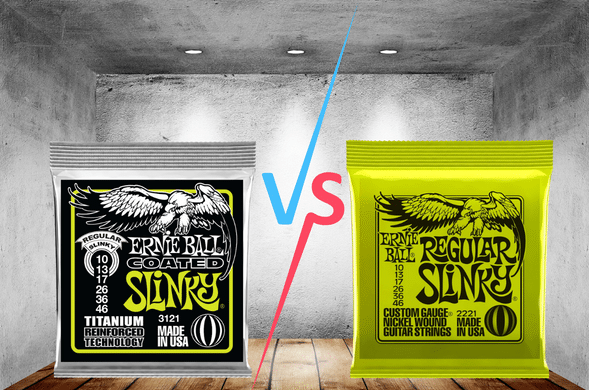

Great article, extremely detailed! I had never heard of coated strings before, this was a great introduction. My daughter has started playing an electric guitar, and we just have the stock strings. Should we replace those? I am judging by your review we should go with uncoated strings on her electric. Are there are a good set for a beginner?
Hi, JT
Thank You for your comments!
I prefer uncoated strings on electric guitars, but the Ernie Ball coated strings I mentioned in the article do sound good!
If your daughter is a new player and has a decent guitar, the strings that came on it are most likely fine. However, when they wear out, they will become “dull-sounding” and may not stay in tune well. Keeping the strings clean will help prolong their life.
When it’s time to change them, I would go with a set of Ernie Ball uncoated strings of the same gauge. If you change the gauge, you might have to have a setup done on the guitar.
Frank 🎸
I remember very well when I bought my very first acoustic guitar and it came with uncoated strings. I had no problem with it because I felt they were easier on my fingers. But as you said, it’s easier for the guitar to go out of tune with uncoated strings. To think that I didn’t learn to tune my guitar the traditional way, lol. I had to rely on a tuner to get my guitar back in tune, lol. Imagine my excitement with the free guitar tuner app!
But while I find uncoated strings better, I also had to change them regularly because they don’t last long just like coated strings do. After 2 string changes, I was forced to switch to coated strings. Well, it didn’t take long for me to adjust. It was a bit difficult at first because I find the strings too stiff and I had to press harder on them to produce a clean sound.
Now, I am comfortable playing whether coated or uncoated strings but I always go with extra light ☺.
Hi, Alice
Thank You for your comments!
Yes, I think coated strings are a better option for an acoustic guitar than an electric guitar. They last longer and have a more balanced tone.
Extra light strings do make it easier to play, but they will give you a thinner overall sound than a heavier gauge set. It’s a tradeoff, and you have to go with what works best for you!
Keep on Playing 😎
Frank 🎸
This is pretty much a one-stop post for guitar strings! I appreciate the short answer at the very top of the page. Very helpful.
Looks like there is no real answer to which one is ‘better’, but rather it depends on your needs as a musician.
I’m someone that’s starting out (As in, I’ve only just learned Smoke on The Water on the top string LOL!). Would you recommend I get the coated strings for durability as I’m learning?
Hi, Anoth
Thank You for your comments!
Congratulations on learning to play the guitar! We all start out at essentially the same place. You will look back on that someday and realize how much fun you had discovering even simple things!
No, I don’t think coated strings will help you at this point. Instead, concentrate on continuing to develop your playing skills. Your strings should last you quite a while if you clean them after each use.
Frank 🎸